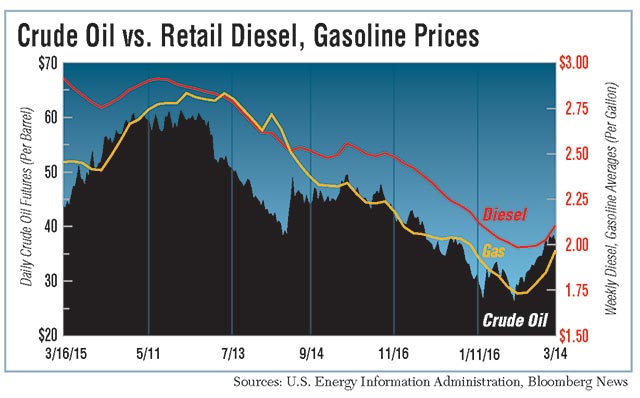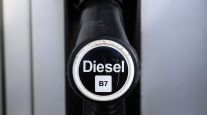Senior Reporter
Diesel Average Gains 7.8¢ to $2.099; Biggest Increase Since February 2013

The U.S. average retail diesel price rose for a fourth consecutive week in the biggest climb in a single week since 2013, as it marched after higher oil prices.
Diesel jumped 7.8 cents to $2.099, the Department of Energy said on March 14.
That was its biggest weekly gain since Feb. 11, 2013, when it ballooned 8.2 cents over the previous week.
Diesel remained 81.8 cents cheaper than a year ago when the price was $2.917, DOE said.
Also, the average price of regular gasoline leaped 12 cents to $1.961, DOE said after its March 14 survey of fueling stations.
That was gasoline’s highest weekly increase since March 2, 2015, when it spiked 14.1 cents to $2.473. Still it was 49.2 cents cheaper than a year earlier.
Despite the increases, analysts remained confident the overall low-price environment would continue.
“The expectation we have, and I think most carriers have, is that [diesel] is going to stay down in this area — maybe not below $2, but I don’t think anyone is really expecting a big increase, in part because demand isn’t all that strong,” Tom Sanderson, CEO of logistics provider Transplace, told Transport Topics. “Also, if you look at the inventory levels of crude oil, they are enormous,”
Low fuel prices are especially helpful for truckload carriers because, in many cases, they run empty and out-of-route miles that do not qualify for a fuel surcharge, Sanderson said.
Diesel rose in all regions of the country last week and remained barely below $2 in only two areas: the Gulf Coast, the lowest overall, at $1.990, and the Rocky Mountain area at $1.999. Once again, California had the highest price, $2.390.
“Make no mistake. There are stronger crude oil prices right now [lifting diesel prices]. The price of crude oil has jumped up from its bottom,” Denton Cinquegrana, an analyst with the Oil Price Information Service, told TT on March 16.
“We even made a run at $40 a barrel late last week but fell just shy of it,” he added.
Crude oil futures on the New York Mercantile Exchange closed at $38.50 on March 11, the highest price in a month and closed at $42.20 on March 17.
“Diesel prices are going to remain relatively cheap,” compared with the past couple of years, Cinquegrana said.
DOE’s Energy Information Administration reported that distillate stocks fell by 1.1 million barrels the week before to 161.3 million barrels from 162.5 million. A year earlier, the stocks stood at 125.9 million barrels.
Cinquegrana noted distillate stocks were still heavy for this time of year, but they had gone down in recent weeks. He attributed some of the decline to refineries’ planned spring maintenance schedules, saying those were in the “seventh or eighth inning, in a baseball analogy.”
EIA also said March 16 that total motor gasoline imports, including both finished gasoline and gasoline blending components, last week averaged 716,000 barrels per day. Distillate fuel imports averaged 258,000 barrels per day last week, which was up from 133,000 barrels the week before.
Meanwhile, Cinquegrana said he expects retail gasoline prices in the second or third quarter are going to be higher than those for diesel. He noted the prices for the two fuels were within about 15 cents of each other. “A month ago, it was almost 30 cents.”
Looking at where oil prices may go, Angus Nicholson, an analyst at IG Ltd. in Melbourne, Australia, told Bloomberg News, “There is a downside risk to prices if Iranian output picks up a lot quicker than markets are expecting. Oil has had some pretty good upward momentum, but there is still a huge amount of inventory that needs to be cleared.”
Bloomberg said Iran aims to increase production to 4 million barrels a day before it will consider joining oil producers in a proposal to freeze output.
That would be the highest since October 2008, according to the Joint Organisations Data Initiative, a collaboration based in Riyadh, Saudi Arabia. Iran was OPEC’s second-biggest producer before sanctions were stepped up in 2012.




